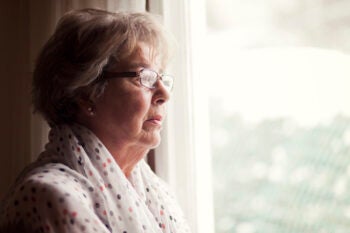Home / Health & Wellness Articles / Grief /
Finding a Way Forward: Navigating Life After the Death of a Spouse

Losing a spouse is one of the most life-altering events a person can experience. For those left behind, feelings of grief and the weight of the void can lead to significant changes in daily routines. While navigating this loss can be difficult, there are ways to ensure that you have the support you need.
What are the emotional, mental, and physical effects of losing a spouse?
After the loss of a spouse, the surviving spouse can experience an array of mental, emotional, and physical responses. These may include, loneliness, guilt, fatigue and exhaustion, and depression. However, Neesha Roberts, Manager of Clinical Program Development at Centerstone, notes that many of these effects can be invisible to others. “The impacts that are invisible are similar to someone detoxing from drug use,” Roberts adds. Nonetheless, grief is an emotional injury that can be deeply painful.
When should I seek professional help for processing my grief?
There is no set timeline for experiencing grief because, in some ways, it stays with us forever. However, it may be beneficial to seek professional help after a certain amount of time has passed. “If it is a year after the loss and it is still as painful and disruptive to your life as it was those first three months, there are likely some ways of thinking or other barriers in your life that are keeping you from moving through the natural grieving process,” adds Roberts. Sometimes, the loss of a spouse can be traumatic, especially if they were lost unexpectedly or in a traumatic way. If you find yourself having intrusive thoughts or nightmares about their death, this could indicate symptoms of post-traumatic stress disorder (PTSD). If you notice these or similar symptoms, it would be best to seek help right away as early intervention may help you prevent fully developing PTSD. Keep in mind that if you attend therapy or seek help right away due to the traumatic nature of the death, it will be to receive psychological first aid, similar to those who receive psychological first aid following a natural disaster. This type of help is focused on providing emotional and practical support, it won’t be focused on making sense of the loss.
How can I feel comfortable creating a new daily routine without my spouse?
It can be hard to get back into a routine after it is disrupted by grief, and it may feel especially hard to move into a new normal without your spouse. But just remember that developing a new routine doesn’t mean that you are over their death or that you aren’t honoring them. It just means that you are moving forward to feel fulfilled in a life without them. It is common to feel like you don’t know who you are without that person, so it can be helpful to go back to the basics and think about your values and what’s important to you. Reminding yourself that you still have meaningful goals can give direction in this new season. Additionally, consider thinking of things that you always wanted to do as a child. “You likely didn’t know your spouse as a kid,” says Roberts, “so this is a way to help you find purpose and feel joy that is separate from them.”
How can I combat loneliness while grieving?
In the days and weeks after the funeral, it can sometimes be difficult to ask friends and family for support. In this case, grief groups can be immensely helpful. Not only are you not alone, but you are in a room filled with people who know exactly how you feel and what you’re going through. Grief groups can be accessed both online and in person making it easier to find one that works best for you.
How can I discuss the death of my spouse with my young children?
Conversations surrounding death will look different depending on the developmental age of the child. However, regardless of their age, don’t feel the need to suppress your emotions for their sake. A common reaction in this situation is to try to stay emotionally strong for the child, but being honest with them and showing your emotions can actually be beneficial for them and help them better understand what is happening.
How do I find purpose after the death of my spouse?
“It may not be what they want to hear, but I would tell them to come up with a goal they want to reach that has nothing to do with their spouse,” says Roberts. While it’s natural to want to honor their memory, focusing on your own goals and needs can be a crucial step in healing. This can help you find your identity again and remember that you were a whole person before you met them and you are still a whole person without them. When it comes to honoring their memory, there is no right or wrong way, so do what feels right for you and your family.
Remember that grief never really goes away, but instead, we learn to grow with it. If you are navigating the death of your spouse and are in need of additional mental health support, Centerstone can help. Visit our counseling services page or call us at 877-HOPE123 (1-877-467-3123) to learn more.
Readers in the state of Tennessee, check out our virtual grief groups through Centerstone’s Tennessee Virtual Clinic.


